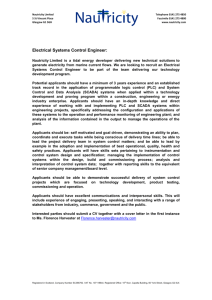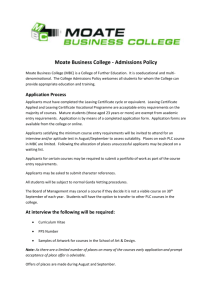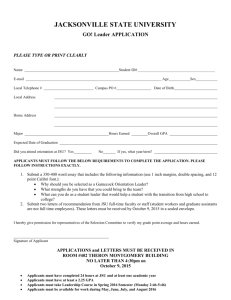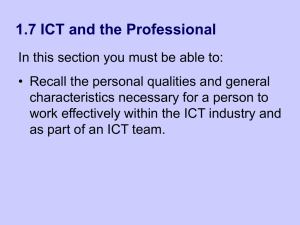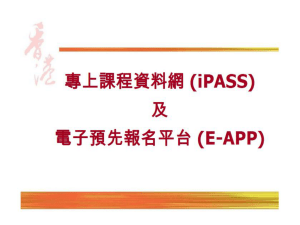Checklist for Hiring City Employees
advertisement
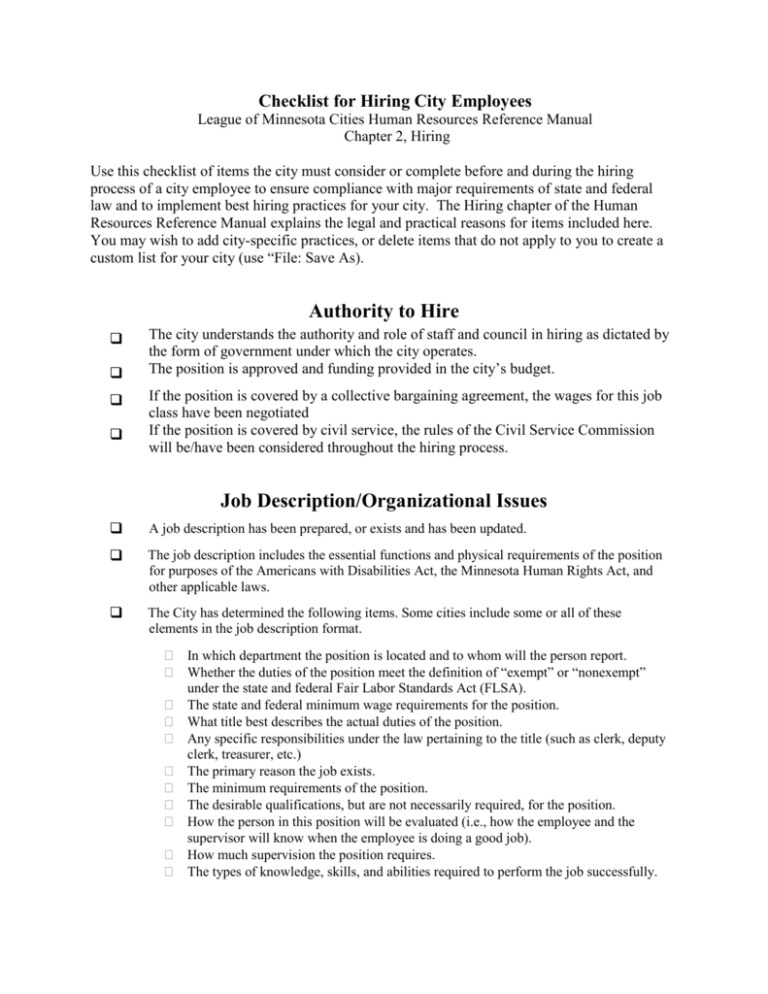
Checklist for Hiring City Employees League of Minnesota Cities Human Resources Reference Manual Chapter 2, Hiring Use this checklist of items the city must consider or complete before and during the hiring process of a city employee to ensure compliance with major requirements of state and federal law and to implement best hiring practices for your city. The Hiring chapter of the Human Resources Reference Manual explains the legal and practical reasons for items included here. You may wish to add city-specific practices, or delete items that do not apply to you to create a custom list for your city (use “File: Save As). Authority to Hire The city understands the authority and role of staff and council in hiring as dictated by the form of government under which the city operates. The position is approved and funding provided in the city’s budget. If the position is covered by a collective bargaining agreement, the wages for this job class have been negotiated If the position is covered by civil service, the rules of the Civil Service Commission will be/have been considered throughout the hiring process. Job Description/Organizational Issues A job description has been prepared, or exists and has been updated. The job description includes the essential functions and physical requirements of the position for purposes of the Americans with Disabilities Act, the Minnesota Human Rights Act, and other applicable laws. The City has determined the following items. Some cities include some or all of these elements in the job description format. In which department the position is located and to whom will the person report. Whether the duties of the position meet the definition of “exempt” or “nonexempt” under the state and federal Fair Labor Standards Act (FLSA). The state and federal minimum wage requirements for the position. What title best describes the actual duties of the position. Any specific responsibilities under the law pertaining to the title (such as clerk, deputy clerk, treasurer, etc.) The primary reason the job exists. The minimum requirements of the position. The desirable qualifications, but are not necessarily required, for the position. How the person in this position will be evaluated (i.e., how the employee and the supervisor will know when the employee is doing a good job). How much supervision the position requires. The types of knowledge, skills, and abilities required to perform the job successfully. Whether this position supervises other employees. How much public contact the position requires. How is the position impacted by child labor laws (e.g., does the employee operate equipment or work hours prohibited for certain age groups)? Whether the position requires adult supervision (e.g., underage lifeguards)? Recordkeeping for Hiring Process The city has a checklist for the hiring process so no steps are accidentally missed. The city has a “procedure file” established which includes: Job description. Job posting. Copies of any advertisements for the opening and which newspapers, magazines, newsletters, websites, or other places the position was advertised. Application forms received from all candidates. Supplemental application forms (if used). Rating sheets for veterans preference. Interview questions for all rounds of interviews (and rating sheets from the interview panel if used). Descriptions or copies of any tests used in the process (e.g., skills tests, written tests, etc.). Listing of candidates chosen for each round of interviews and list of interview panel members. Final results of the process. Copies of notices sent to applicants not selected for the job or for an interview. The city reports new hires to the child support enforcement authorities. The city completes I-9 forms on all employees. The city completes W-4s on all employees. The city maintains a copy of the release form signed by an applicant for checking references and performing other types of background checks. Job Postings and Posting Process The city uses a job posting which summarizes the position’s duties, work hours, pay scale, overtime status, minimum and desirable requirements, and information about how to apply. The city sends a copy of the job posting to these groups as appropriate: Members of professional associations. Anyone calling to inquire about the position. Neighboring cities or local government organizations. Local businesses. The city places a copy of the posting in all city locations, or on the city website and/or intranet. The city has determined how the position will be posted: internal only, internally prior to an open external recruitment, or an open external recruitment. Job Ads The city considers placing the job ad in publications or on websites to reach minority populations. The job ad was reviewed by an attorney or human resources professional to make sure there are no indications of preference based on age, sex, national origin, or any other protected status. The city placed the ad in papers, publications, and on websites most likely to draw a qualified pool of candidates. The city explains how to apply for veterans preference points either in the job ad, on the application, or both. Application and Rating Process The city’s employment application form has been reviewed by the city attorney or a human resources professional to make sure there are no illegal or inadvisable questions? The employment application includes a Veterans Preference Point application form. If my city has more than 100 employees, the employment application includes a voluntary Equal Employment Opportunity survey form in order to complete the city’s EEO-4 form. The city evaluates whether or not to use a supplemental application form to make ranking and rating veterans easier. The city has designed a form to rate applicants for the position. Alternatively, the city has decided (in advance) upon the criteria to be used for rating them. The rating form includes veterans preference points. If applicable in my city, the employment application includes a disclaimer about employmentat-will? The employment application form provides information to the applicant about his or her rights under the Minnesota Government Data Practices Act, including a Tennessen advisory. The employment application form contains a nondiscrimination/equal employment opportunity statement. The employment application form includes contact information for reasonable accommodation requests during the application process. The employment application (and supplemental application form, if used) requires the applicant to verify all information provided is true and complete, and to attest to any false statements may be grounds for disqualification or termination if hired. Testing and Selection Process Any formal written or skills tests to be administered, such as ones listed below, been examined for adverse selection and validity issues. In-basket exercises Physical agility tests Typing and proofreading tests Standardized tests purchased from a testing company Writing style tests All POST Board requirements have been met for police officer testing and selection. The city reviewed its union contract, if any, to ensure the contract does not limit the city’s right to select supervisors or require the use of seniority in the selection process. (Minnesota law prohibits the city from signing such an agreement.) The city has decided what type of interview process will be used, e.g. Interview panel members (city employees, residents, professionals from other cities, councilmembers, etc.). How many rounds of interviews. Interview panel members have been trained about how to conduct the interview (e.g., avoid leading questions; ask only job-related, follow-up questions; ask same questions of all applicants; etc.). The interview questions have been examined by an attorney or human resources professional to ensure no illegal or inadvisable questions are being asked. The interview questions were developed with the knowledge, skills, and abilities required for the position in mind. Applicants have been notified reasonable accommodations can be made during the interview/testing process upon request. If job applicants will be required to demonstrate job-related skills through a role-play, mock presentation, or operation of city equipment: The tests measure actual skills used on the job for essential functions of the position, and The city can show these skills predict future job success. The city has considered safety/liability issues with operating equipment used during testing? The city does not conduct polygraph (or any other type of lie-detector) testing on its employees or applicants as this practice is prohibited by state law. Medical and Psychological Exams The city conducts medical and psychological exams for police officer candidates as required by state law. Medical exams are conducted post-offer and required for anyone being hired in that job class, in compliance with the Americans with Disabilities Act (ADA) and Minnesota Human Rights Act (MHRA). The medical exams comply with the requirements of the Genetic Information Nondiscrimination Act (GINA)? If personality or other similar assessments are conducted pre-offer they have been reviewed by the city attorney to ensure they are not likely to be viewed by the courts as medical exams. Medical exams, including psychological exams, used by the city to evaluate job candidates have been reviewed by an attorney or human resources professional to ensure no questions are asked about disabilities, family medical history, sexual orientation, religion, or other applicable protected categories. The city makes arrangements to cover the expense of any medical examination or furnishing of any medical records from the employee. Drug and Alcohol Testing The city has established a drug and alcohol testing policy/procedure for all holders of commercial driver’s licenses. If the city conducts pre-employment drug and alcohol testing of its employees other than commercial driver’s license holders, it has reviewed its policy/practices for compliance with state law so that: All applicants for the same job are required to take the same test, and Tests are administered only after a job offer has been made to the applicant(s). The city has reviewed its practices and trained appropriate employees about giving out information on applicants, before and after they become finalists for a position. The city has reviewed its practices and trained appropriate employees about giving out information on the selection process itself (e.g., test questions, interview questions, etc.). Communicating with Applicants The city complies with the requirement under the Veterans Preference Act to notify applicants of the reason the veteran was not contacted for an interview or the reason the veteran was not hired following an interview. The city has trained appropriate employees how to handle calls from applicants who were not selected for a position. The city has trained appropriate employees regarding what information can be given to applicants. Sharing Information about Applicants The city has reviewed its practices and trained appropriate employees about giving out information on applicants, before and after they become finalists for a position. The city has reviewed its practices and trained appropriate employees about giving out information on the selection process itself (e.g., test questions, interview questions, etc.). Reference Checks on Job Applicants The city conducts reference checks on all job applicants. The city trained appropriate staff about what can and cannot be asked during a reference check on a job applicant. The city requires applicants to sign a release form before conducting reference checks. Background Checks The city conducts background checks on all police officer candidates and for all positions leading to employment as a police officer as required by state law, including: POST Board minimum selection standards and Security standards for access to computerized records. The city releases background check information on police officers to other jurisdictions as required by statute after verifying that appropriate releases have been signed. The city uses appropriate release forms to obtain permission from the job applicant when it conducts background checks (e.g., criminal history checks, credit history checks, others). The city notifies the POST Board when it begins a background check on a job applicant for police officer. If the city uses its own police department to conduct criminal history checks, the staff in the police department has been trained on how to run the check appropriately and what to release. The city has reviewed its practices on criminal history checks, adopted a policy regarding how background checks will be handled, and ensured checks comply with the Criminal Offenders Rehabilitation Act and 2012 EEOC guidance. The city conducts background checks on firefighter applicants for hire. The city considers which types of background checks to run on job candidates other than police officers (e.g., credit history check on finance staff with access to city funds; criminal history checks on staff who work with children; etc.), depending on the position requirements. Offer/New Hire Letters The city sends a letter to each new hire outlining the hire date, rate of pay, regular work hours, and other requirements of state law. The city reviewed its practices on job offers to ensure no unintentional employment contracts are being created. The wage paid to the employee is in compliance with the minimum wage rate (new Minnesota minimum age rate effective August 1, 2014, with scheduled increases in 2015 and 2016). New Employee Orientation The city established a procedure for new employee orientation to explain wage issues, personnel policies, benefits, city practices on parking, lunches, “casual day,” breaks, etc. The city established a “sign-off” procedure to document new employees received a copy of the employee handbook and/or participated in an orientation.



